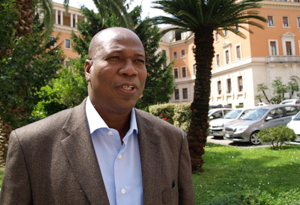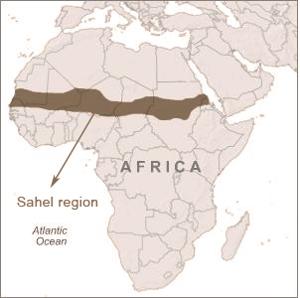
Fr. Isidore Ouédraogo, the Secretary General of Caritas Burkina Faso (OCADES)
Credits: Caritas
Over 800,000 children are at risk as malnutrition increases across Niger, Chad, Mali, Burkina Faso, and Mauritania in West Africa. We asked Fr. Isidore Ouédraogo, the Secretary General of Caritas Burkina Faso (OCADES) about the food crisis.
Q : The Sahel region in West Africa is facing a serious food crisis. How is the situation in Burkina Faso?
Fr. Isidore Ouédraogo: It is less serious than in Niger, but we still have to monitor things closely. The 2009 harvest was bad, in particular because floods hit several regions of Burkina Faso. The floods weakened the economy in general, a lot of people had to sell all their grains. With several food crises in the last years, more and more people are living in poverty. Grains and livestock function like the household’s bank account in many Burkinabe families. They are the savings that allow them to pay for a sick parent, finance the children’s school supplies, buy diverse foods for a balanced diet. Usually, families sell their livestock first when they are in difficulty. But a lot of them haven’t had livestock for several years. You can easily infer the crises’ long-term consequences, mainly poor education, illnesses and malnutrition.
Q : What is Caritas going to do to respond to the emergency ?
A : We will step in in the North and North-East of the country. Some of Burkina’s poorest regions are there. Shortly, we will launch an appeal to help around 1,500 households of six people in average. We will deliver emergency food aid and distribute seeds, fertilizers and tools to improve production. The appeal will target the most vulnerable, mainly single parent families, women-headed households and families who have suffered from the floods.

Hunger spreading in West Africa’s Sahel
Q : What needs to be done to fight endemic food insecurity in the Sahel?
A : Most of all, we need to go back to strengthening the local food production. For a long time, the government and international institutions focused on the production of cotton for exportation. The revenues from exports were supposed to feed people. But things don’t work out like that. We have seen that with the 2006 to 2008 food crises, where price fluctuations and speculation hit us very hard.
Food sovereignity is important, the food needs to be produced by our small farmers here in Burkina Faso. 80 percent of the Burkinabe are farmers. They need to produce food for their own consumption, but also to make a living. The small farmer can then make his own choice, whether he wants to sell his sorghum and buy a higher quantity of imported rice from Asia instead for example, but it is the local production that will help him access the global economy.
The food crisis in Niger affects us indirectly, because it has lead to a severe increase in food prices in Burkina Faso and encouraged speculation here as well. Efforts need to be coordinated at an regional level, through the Economic Community of West African States (ECOWAS) for example. We are strongly against a savage liberalisation in a sector as important for our people’s survival as food, it is just not right.
Q : How can we help the small farmers improve their production ?
A : Farmers need to adjust to climate change and difficult conditions. Caritas gives them high quality seeds, fertilzer and tools and improves access to water through the construction of small dams and wells.
Production needs to be diversified, too. The Burkinabe essentially produce sorghum and peanuts because that works with the type of soil we have. But there are other options. We encourage people to grow vegetables, green beans, potatoes, carrots, cabage, egg plants and even strawberries.
When it comes to water access, we need to exploit renewable energies, like solar energy. A solar pump on a well that can pump 3 to 5 cubic metres per hour for example can water a one hectar field the whole year. This can help an entire village earn substantial revenus. Women can work on these fields and children can then be sent to school.
The cost of this type of installation is 30,000 euros. But it is a durable investment, the type of intervention Caritas favours. Of course, we do not close our eyes when people are hungry and need food aid, but most of all, our work should improve the situationlong-term. We want to help people to help themselves.
We also intervene at the level of food processing and distribution. Take the processing of sorghum for example. In poor villages, women spend long hours to do it by hand. A small mill would make their work much more effective.
